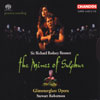Bennett, RR (The) Mines of Sulphur
A tense thriller receives a recording that reveals its evocative atmosphere
View record and artist detailsRecord and Artist Details
Composer or Director: Richard Rodney Bennett
Genre:
Opera
Label: Chandos
Magazine Review Date: 10/2005
Media Format: Super Audio CD
Media Runtime: 107
Mastering:
Stereo
DDD
Catalogue Number: CHSA5036

Tracks:
| Composition | Artist Credit |
|---|---|
| (The) Mines of Sulphur |
Richard Rodney Bennett, Composer
Beth Clayton, Rosalind, Mezzo soprano Brandon Jovanovich, Boconnion, Tenor Brian Anderson, Fenney, Tenor Caroline Worra, Jenny, Soprano Dorothy Byrne, Leda, Mezzo soprano Glimmerglass Opera Orchestra James Maddalena, Tovey, Baritone Kristopher Irmiter, Braxton, Bass-baritone Kristopher Irmiter, Sherrin, Bass-baritone Michael Todd Simpson, Tooley, Baritone Richard Rodney Bennett, Composer Stewart Robertson, Conductor |
Author: Peter Dickinson
The Mines of Sulphur was a Sadler’s Wells commission premiered in 1965. It was a considerable success – I saw it – and then it went on to Zagreb and Paris, followed by La Scala, Cologne and the Juilliard School, New York. It is easy to see why such an expertly crafted opera was well received but harder to explain its neglect and delayed entry into the record catalogue. The opera is dedicated to Britten but, apart from the evocative recurring horn-calls, the style is distilled from the Second Viennese School. For once there’s nothing wrong with an opera libretto and Beverley Cross went on to do two more for Bennett.
The Mines is a gripping thriller set in an isolated, decaying country house. A rich old landowner (Braxton) brutalises his maid (Rosalind) who allows an army deserter (Boconnion) and a tramp (Tovey) to enter the house. Boconnion murders Braxton in his bed so they can rob him and start a new life in America. Before they can make off, a troupe of actors comes to the door seeking shelter. Boconnion allows them in on condition that they perform a play.
This is the play-within-a-play, the procedure used in Hamlet, and it has similar results. A rich old Count (Sherrin) finds a young wife (Haidee) through the initiative of his valet (Hugo). The Count is not interested in her physically so she invites the valet to oblige – in a passionate orchestral outburst. When they are caught and the valet is about to kill the Count the resemblances to real life cause the impostors to stop the play – a crisis which reduces the singers to speech. When the actors realise the owner of the house has been murdered, Boconnion tries to hold them to ransom and starts to abuse one of them (Jenny). But the other actors escape and the grisly climax comes when they discover that she is infected with the plague – they are all doomed anyway. Their final incantations of ‘Lord have mercy on us’ make a mesmeric ending.
This recording is taken from live performances so the action is easy to visualise, even if the sound is not quite of studio quality. Bennett’s formative experience as a film composer makes him expert at conveying atmosphere. The oscillation between lyrical arioso and violence is compelling; there are countless examples of evocative scoring; and the word-setting is realistic and well enunciated. Jovanovich (Boconnion) and Maddalena (Tovey) are both powerfully convincing; Beth Clayton and Caroline Worra (Rosalind and Jenny/Haidee) are scintillating; everyone is well cast and directed – as Bennett’s own tribute indicates – in this astonishingly assured first full-length opera, which belongs in the repertoire.
The Mines is a gripping thriller set in an isolated, decaying country house. A rich old landowner (Braxton) brutalises his maid (Rosalind) who allows an army deserter (Boconnion) and a tramp (Tovey) to enter the house. Boconnion murders Braxton in his bed so they can rob him and start a new life in America. Before they can make off, a troupe of actors comes to the door seeking shelter. Boconnion allows them in on condition that they perform a play.
This is the play-within-a-play, the procedure used in Hamlet, and it has similar results. A rich old Count (Sherrin) finds a young wife (Haidee) through the initiative of his valet (Hugo). The Count is not interested in her physically so she invites the valet to oblige – in a passionate orchestral outburst. When they are caught and the valet is about to kill the Count the resemblances to real life cause the impostors to stop the play – a crisis which reduces the singers to speech. When the actors realise the owner of the house has been murdered, Boconnion tries to hold them to ransom and starts to abuse one of them (Jenny). But the other actors escape and the grisly climax comes when they discover that she is infected with the plague – they are all doomed anyway. Their final incantations of ‘Lord have mercy on us’ make a mesmeric ending.
This recording is taken from live performances so the action is easy to visualise, even if the sound is not quite of studio quality. Bennett’s formative experience as a film composer makes him expert at conveying atmosphere. The oscillation between lyrical arioso and violence is compelling; there are countless examples of evocative scoring; and the word-setting is realistic and well enunciated. Jovanovich (Boconnion) and Maddalena (Tovey) are both powerfully convincing; Beth Clayton and Caroline Worra (Rosalind and Jenny/Haidee) are scintillating; everyone is well cast and directed – as Bennett’s own tribute indicates – in this astonishingly assured first full-length opera, which belongs in the repertoire.
Discover the world's largest classical music catalogue with Presto Music.

Gramophone Digital Club
- Digital Edition
- Digital Archive
- Reviews Database
- Full website access
From £8.75 / month
Subscribe
Gramophone Full Club
- Print Edition
- Digital Edition
- Digital Archive
- Reviews Database
- Full website access
From £11.00 / month
Subscribe
If you are a library, university or other organisation that would be interested in an institutional subscription to Gramophone please click here for further information.




